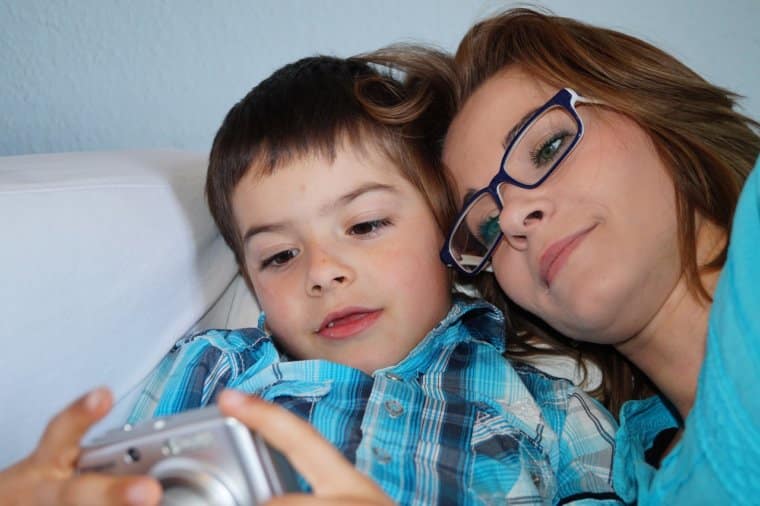We enter parenthood looking forward to sharing the journey fully with our partner. We hope to carve up the practicalities as well as talk and dream together about how to raise our children. We want to share what’s going well and what’s not and to reflect on the details of the day. But many of us discover that our parenting partner is less interested than we are in the finer points of child rearing, or directly disagrees with our way of doing things. When we start using Parenting by Connection it is natural to want our partner to do the same. A partner’s disagreement or lack of interest leaves us in a much lonelier situation than we’d hoped for. It can lead us to feel frustrated and disappointed. And these feelings tend to make us relate to our partners in ways that aren’t so helpful.
A good starting point is to notice that, more than anything, we want a close loving family. When we approach our partner with the intention of connection, rather than “being right” or doing things a certain way, we find there are many ways of bridging the gap between us and getting support for ourselves. The ideas that follow might help.
1. Introducing Your Partner to Parenting by Connection
Slowly model the tools
In order to reach out to our partners, we need to build warmth and take a long-range view that we might be able to slowly bring them on board. There are good reasons your partner is in disagreement, or is less interested in parenting than you. They may be preoccupied with earning a living and supporting the family. Perhaps a difficult childhood makes it painful to turn their attention to parenting, or to consider strategies that are based on connecting when a child’s behaviour goes off track. Whatever your partner’s reasons, you need to share your skills and knowledge at their pace and in a way that gently opens the door to new ideas.
A powerful way to do this is to think about teaching through modelling. As the leader of your family, you guide the way each day as you interact with your children and partner. As you model Parenting by Connection and gently offer small pieces of guidance, your partner will slowly pick up on the ideas and start to use them. For instance, after modelling Setting Limits for a while you may be surprised to hear your partner holding the limit and saying, “I'm not going to let you do that,” without any explanation from you as to why that’s a good way to do things.
Bite-sized guidance
Every now and then you can offer bite-sized bits of guidance to gently explain Parenting by Connection. Little comments like, “See how much more relaxed she is after that big cry,” or “See how after all those pillow fights, he’s got the confidence to try and learn to ride his bike,” can slowly build up your partner’s understanding without overwhelming or threatening them. Using everyday language may be also be useful, like “let off steam” instead of “offload feelings;” “hit a sore spot” instead of “got triggered.”
Wait to be asked
Whilst you’d probably love to rush in and explain all you’ve learned, it can be much better to wait for your partner to raise an issue for discussion. Make yourself listen carefully to their concerns and ideas, even if they don't fit with what you want to do. By understanding their worries you can better handle their challenges to your ideas.
Talk about the tools very gently saying things like, “I think it might help if…”, “Yeah I can see what you mean, and I totally agree it's very upsetting to see her hit the dog…I wonder how she’s feeling inside… how we can help her with those feelings?” Standing back a little and making a gentle, slow approach will help your partner make huge shifts in their parenting over time and keep them receptive to your ideas.
Offer a little bit of reading You might try to carefully offer your partner some reading. You could kindly say something like, “I know you’re not really into reading parenting stuff but would you mind just looking at this? Tell me what you think.”
You might try to carefully offer your partner some reading. You could kindly say something like, “I know you’re not really into reading parenting stuff but would you mind just looking at this? Tell me what you think.”
You could offer the first booklet in the Listening to Children Series, “How Children’s Emotions Work,” or choose from an article from Hand in Hand website that relates to a current issue you face with your child, or, if your partner is a Dad, try the “Fathers are Primary Parents” article. Choose what you think they might realistically read. You can always offer some more reading later.
When they have finished you may be eager to talk about it, but it might be wiser to wait for them to take the initiative to comment, rather than push the discussion. However little they talk about it, trust that much useful information will have sunk in. If they just bring up objections to the approach, listen carefully and respond kindly. You are learning about them and, most likely, about their childhood, as they speak.
If they’re not interested in reading anything, just accept that and try another way, or another time.
Careful exposure to the tools
Notice which of the tools your partner can handle. Maybe they are fine with Special Time but get restimulated when you Staylisten or playfully set limits. It won’t help to drive your partner into big feelings; it will only make it harder for them to want to come toward this approach.
For instance, you might notice that when you listen to your child cry your partner gets upset. It might be prudent to only listen for a short time or redirect your child, and wait to Staylisten at a time when your partner isn’t around. Over time, as your partner better understands the Listening Tools and they are able to shed some of the feelings that arise quickly for them, they will likely get better at watching you use the tools that are currently difficult for them to witness. They may even start using those tools themselves.
2. Building Family Connection
Building warmth
It’s helpful to think about building warmth with your partner. One simple, yet highly effective idea is to have a weekly date together where you don’t talk about the children. This can be as straightforward as an hour chatting together over a drink or a meal after the kids have gone to bed. You can use this as a chance to shine your warm attention on your partner like you do with your kids in Special Time.
Arrange time for your partner to be alone with the children
More than anything, we want our partners to have a close connection with our children. An effective way for them to create that is to have regular time alone with the kids. Without us around, our partners can find their own way of enjoying their children, and at the same time build confidence in their parenting.
Perhaps your partner is able to take the kids off for an hour or more each week to do something fun together like play on the beach or kick the ball at the park. The amount of time you arrange needs to be what is currently manageable for your partner. This kind of regular time alone with the kids will help build your partner’s closeness with your children. They are also likely to come back with questions every now and again about what to do when something difficult happens. This is the perfect opportunity to offer a bite-sized chunk of guidance.
Promote laughter by playing the less powerful role in play
Another way to build the connection between your children and your partner is to use Playlistening together, as a family. See what kinds of games you can create around your partner, so that you're using laughter and silliness to strengthen all the connections in the family. Games of chase; games of offering kisses and allowing the children and your partner to scamper away, often successfully; games of hide and seek, games of your partner teaming up with the children to fool you or surprise you or “scare” you are a great way to build trust and closeness.
Appreciate your partner’s efforts It can do wonders for your parenting relationship to let your partner know that you notice the things they do well—especially the things they do so much better than you. Maybe your partner is particularly good at sparking lots of fun and silliness when they’re with your children. Every now and then say things like, “Oh, I think it did the kids so much good to hang out with you today. You obviously had so much fun together. I've been a bit boring this week: I think they really needed your silliness energy,” or “You did so well there, gently not letting him have another glass of juice.” You don’t need to go over the top; simply, honestly appreciate their efforts.
It can do wonders for your parenting relationship to let your partner know that you notice the things they do well—especially the things they do so much better than you. Maybe your partner is particularly good at sparking lots of fun and silliness when they’re with your children. Every now and then say things like, “Oh, I think it did the kids so much good to hang out with you today. You obviously had so much fun together. I've been a bit boring this week: I think they really needed your silliness energy,” or “You did so well there, gently not letting him have another glass of juice.” You don’t need to go over the top; simply, honestly appreciate their efforts.
Find what you can agree on
It’s often possible to find a way to agree on how to handle a situation, even if you and your partner are coming at it from different angles. You may be able to find a way to handle difficult moments that meets many of your wishes (if not all of them) whilst being good enough for your partner, too.
Let your partner experiment
It can bring enormous rewards to give your partner a bit of slack to experiment. Learning to sit back and let them try things that are different from what you do can be hard, but it may help you both learn. Sometimes your partner will reflect on what he or she is trying and you'll have the chance to listen and make suggestions when they’re receptive to new ideas.
Protect your children
With letting your partner experiment you can hold the bottom line—you will step in as gently as possible and protect your children if your partner is behaving in a way that you think is totally out of order, like shouting at them or hitting them.
Raise awareness of how both grownups and children get triggered
It’s particularly helpful for your partner to understand the concept of stored feelings flooding the mind and powering knee-jerk reactions. It happens for parents. It happens for children. When we get triggered and act in ways that are hasty and heated, we can be sure that some detail in the present has triggered big feelings that were stored away long ago, and we’re no longer responding to the present moment. Here’s an article about why we get triggered that might help you explain this concept. If you try to communicate about it at a time of upset, you can be sure your point will not be well-taken. Instead, choose at a time when you and your partner are in good communication, and things are going smoothly.
One way to explain the concept of restimulation to your partner is to ask for help when you get triggered. “Hey, I think I need some Time Out. Can you look after Jimmy for 5 minutes? I can’t be with him just now—I’ll explain later.” Afterwards, say “Oh gosh, all he was doing was mixing all the colours so he had brown paint and I know he wasn’t doing anything wrong, but it just irritated me. I think it’s because when I was little my Mum would get so cross if I ‘wasted’ paint…” After doing this many times you may then be able to gently prompt your partner when he or she has been triggered. “Hey, do you need some Time Out?” And eventually, you might see your partner start to initiate Time Out without your prompting.
Let your partner vent
You can help your partner get Listening Time by letting them “vent.” Use any opportunity your partner starts to talk when he or she is full of emotion, and respond as if this was an impromptu Listening Time. This can be tricky – it’s easy for a partner to trip up our feelings. But the more time you give your partner just to vent their feelings, without you rushing in with big reactions or offering advice, the more they will slowly shed some of the tension that stops them being fully engaged in parenting, or open to new ways of understanding parenting.
And to be clear: it's never okay for your partner to rant and rage at you, the aim of listening to your partner's venting is for them to let off steam not dump on you.
Help your partner talk about early childhood
If you have a regular Listening Partnership, you’ll know how helpful it is to talk about your childhood and work on feelings from that time. You can help your partner do this too. Pick a time when you are alone and things are relaxed between you and ask a little question like, “What would your Dad have done if you'd hit the dog like Sam did today?” One question at a time will probably be enough. This will slowly open up your partner’s awareness of their childhood and how it impacts on his or her parenting.
3. Supporting Yourself
Get support for yourself
Whilst all the strategies above can do so much, they are very hard to do unless you have good emotional support for yourself. You need to clear away the feelings that get in the way of relating well to your partner. Finding a listener can help. (See the Listening Partnerships booklet for more information.) You can use your listener’s attention to grieve how things aren’t going as you hoped, to shed the disappointment and tension you hold about your partner, as well as to talk through the details you would love to be able to share with your partner. You might be able to arrange to have daily check-ins by phone or email to help keep you focused.
It can also be helpful to join a Hand in Hand resource group (which you can do from anywhere in the world with the online programmes). These groups give you a great opportunity to share your parenting journey with like-minded people and help you build your confidence and skills. Once you have built good support for yourself you’ll be in much better shape to help your partner.
You may even have to overcome a partner’s resistance to you doing a Listening Partnership or a Hand in Hand class. You might ask for your partner’s agreement to simply try it as an experiment, to be discussed after three or four tries, or after the class is finished. If it is indeed useful, you can point out the positive changes you’ve experienced, and how they benefit the family.
Use your support system when your partner is restimulated
When your partner is highly restimulated you may find he or she gets critical and worried about your parenting style. This is a hard challenge! But your Listening Partnership is a good place to take the feelings that come up, so you can find the strength to keep responding with connection. And as you grow in your confidence in your parenting you’ll likely find that these criticisms become less upsetting for you.
Focusing on connection, building good support for yourself and adopting a slow and gentle approach to your partner will bring enormous rewards. Over time it’ll help you and your partner make big strides in how you parent alongside each other. It will bring your whole family closer together.
Here’s how it can work, a parent I was supporting shared this: I had (and sometimes still have) some issues with my husband, especially when it came to the Staylistening. I never really thought about it but I guess, the Staylistening probably brings up a lot of stuff from the past, his childhood (it wasn't bad per se, just troublesome at times.)
I decided not to go on too much about that part but concentrated on getting him involved in a lot of special time and Playlistening, roughhousing (which thankfully he LOVES doing with the kids).
I think a real turning point for my husband was when my 7-year-old finally learnt to ride a bike. He had been struggling for over 2 months and was becoming increasingly frustrated – yelling at the bike, screaming when he fell over, walking away from the bike and vowing never to get on it again, kicking it. Nobody wanted to deal with his frustration (it was just too difficult for both my husband and me at the time)so the bike was left in the garage for over 6 months. During school holidays the whole family really got into play – pillow fighting, pretend boxing, jumping, horse rides. After each session, my son had a bit of tantrum, whining about why the play time was so short or some other reason.
The following week, he announced he wanted to ride the bike. We took him out to the park. Something was different – he just seemed to have the right attitude, it didn't phase him if he fell off or if he couldn't steer. He persevered and on that day, he figured it out!
I saw this as an opportunity to explain to my husband that each time my son had his little tantrum, he was ridding himself of all the frustrations that were stopping him from learning something new. Plus I imagine he took out a lot of frustrations on us as he whacked us with pillows!
We still have some disagreements especially when I am keen to have a staylistening session with one of my boys and he steps in to “rescue” me. He's a lot better than in the beginning though.
Meet the Instructor
 Rachel Schofield, a Hand in Hand Instructor with 10+ years experience who can show you how to navigate parenting differences whilst building an utterly delightful relationship. Join her in a Hand in Hand Parenting Starter Class
Rachel Schofield, a Hand in Hand Instructor with 10+ years experience who can show you how to navigate parenting differences whilst building an utterly delightful relationship. Join her in a Hand in Hand Parenting Starter Class

 By
By